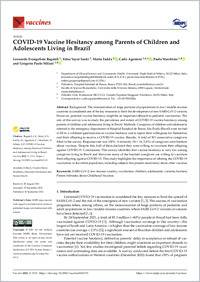COVID-19 vaccine hesitancy among parents of children and adolescents living in Brazil
- Bagateli, Leonardo Evangelista Department of Clinical Science and Community Health, Università Degli Studi di Milano, Milan, Italy
- Saeki, Edna Yayoi Pediatrics, Hospital Estadual de Bauru, Bauru, Brazil
- Fadda, Marta ORCID Institute of Public Health (IPH), Università della Svizzera italiana, Switzerland
- Agostoni, Carlo ORCID Department of Clinical Science and Community Health, Università Degli Studi di Milano, Milan, Italy - Pediatric Unit, Fondazione IRCCS Ca’ Granda Ospedale Maggiore Policlinico, Milan, Italy
- Marchisio, Paola Giovanna ORCID Department of Clinical Science and Community Health, Università Degli Studi di Milano, Milan, Italy - Pediatric Unit, Fondazione IRCCS Ca’ Granda Ospedale Maggiore Policlinico, Milan, Italy
- Milani, Gregorio Paolo ORCID Department of Clinical Science and Community Health, Università Degli Studi di Milano, Milan, Italy - Pediatric Unit, Fondazione IRCCS Ca’ Granda Ospedale Maggiore Policlinico, Milan, Italy
- 2021
Published in:
- Vaccines. - 2021, vol. 9, no. 10, p. 1115
SARS-CoV-2
low-income country
vaccination
children
adolescents
variants
barriers
parent attitudes about childhood vaccines
English
Background: The immunization of large portions of populations in low/middle-income countries is considered one of the key measures to limit the development of new SARS-CoV-2 variants. However, parental vaccine hesitancy might be an important obstacle to pediatric vaccination. The aim of this survey was to study the prevalence and extent of COVID-19 vaccine hesitancy among parents of children and adolescents living in Brazil. Methods: Caregivers of children and adolescents referred to the emergency department of Hospital Estadual de Bauru, São Paulo (Brazil) were invited to fill in a validated questionnaire on vaccine hesitancy and to report their willingness for themselves and their offspring to receive a COVID-19 vaccine. Results: A total of 501 consecutive caregivers filled in the survey. Response rate was 100%. A minority (N = 14, 2.8%) of caregivers were hesitant about vaccines. Despite this, half of them declared they were willing to vaccinate their offspring against COVID-19. Conclusions: This survey identifies that vaccine hesitancy is very low among caregivers living in Brazil and that even many of the hesitant caregivers are willing to vaccinate their offspring against COVID-19. This study highlights the importance of offering the COVID-19 vaccination to the whole population, including subjects that present uncertainty about other vaccines.
- Collections
- Language
-
- English
- Classification
- Medicine
- License
- Open access status
- gold
- Identifiers
-
- DOI 10.3390/vaccines9101115
- ARK ark:/12658/srd1322952
- Persistent URL
- https://n2t.net/ark:/12658/srd1322952
Statistics
Document views: 121
File downloads:
- Fadda_2021_MDPI_vaccines: 235
